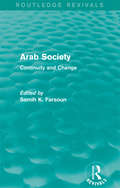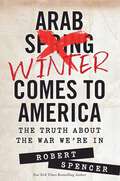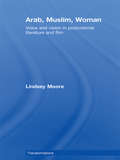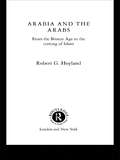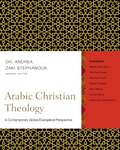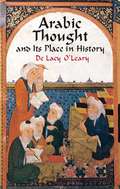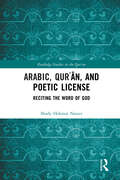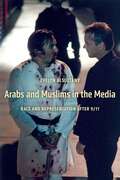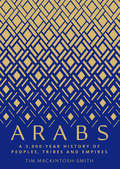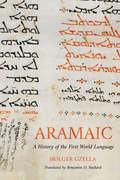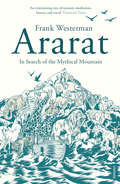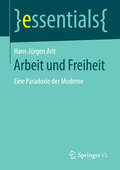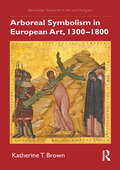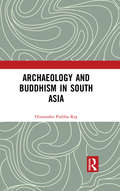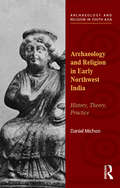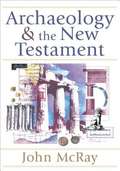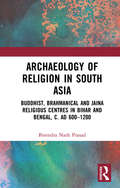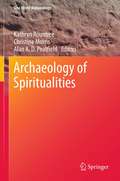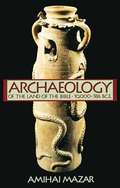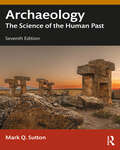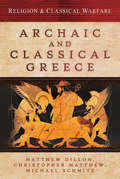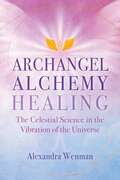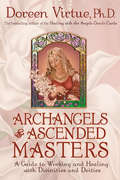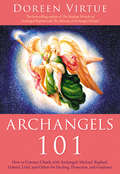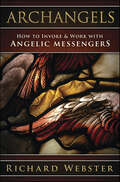- Table View
- List View
Arab Society: Continuity and Change (Routledge Revivals)
by Samih K. FarsounThe Arab world has long been subjected to super-power rivalry for influence and control. The area has been characterized by bloody conflict with Israel and the internal instability that has been particularly prevalent in the last few years. Whilst these political struggles have been highly visible and at times spectacular over the decades, other transformations have taken place within the societies and peoples of the region, on a less pronounced – although just as profound – scale. The integration of the region into the world economy and the spread of Islamic revivalism are perhaps the most significant of these transformations. This volume, inspired by a lecture series on the Arab world in transition at the American University, Washington D.C., was first published in 1985. It discusses a wide range of issues, from economic to religious, which together form an in-depth analysis of the complex processes of transformation in Arab society. This is a fascinating work that holds the same interest and value to scholars and students of Middle Eastern history, politics and domestic affairs, as it did when it was first published.
Arab Winter Comes to America: The Truth About the War We're In
by Robert SpencerOverlooked by our media, purposely obscured by our own government, and unnoticed by the vast majority of Americans, the turmoil of the Islamic world's "Arab Spring" has become an "Arab Winter," bringing new threats of terror to America. New York Times bestselling author Robert Spencer, an expert on Islam and terrorism, reveals why America is shockingly unequipped to face this threat. In Arab Winter Comes to America: The Truth about the War We're In, you'll learn why the Obama administration has opted to appease rather than confront Islamic extremists in the United States; how Muslim organizations are pressuring witnesses to terror crimes not to cooperate with authorities; why the Justice Department has buried select news stories; and much, much more.The "Arab Spring" uncorked a jihadist genie in North Africa and the Middle East. It is about to wreak its mayhem here, with renewed terrorism. Americans need to inform themselves of the threat-and ensure that their elected government in Washington takes action. Robert Spencer's Arab Winter Comes to America sounds the alarm and shows what needs to be done. It is essential reading.
Arab, Muslim, Woman: Voice and Vision in Postcolonial Literature and Film (Transformations)
by Lindsey MooreGiven a long history of representation by others, what themes and techniques do Arab Muslim women writers, filmmakers and visual artists foreground in their presentation of postcolonial experience? Lindsey Moore’s groundbreaking book demonstrates ways in which women appropriate textual and visual modes of representation, often in cross-fertilizing ways, in challenges to Orientalist/colonialist, nationalist, Islamist, and ‘multicultural’ paradigms. She provides an accessible but theoretically-informed analysis by foregrounding tropes of vision, visibility and voice; post-nationalist melancholia and mother/daughter narratives; transformations of ‘homes and harems’; and border crossings in time, space, language, and media. In doing so, Moore moves beyond notions of speaking or looking ‘back’ to encompass a diverse feminist poetics and politics and to emphasize ethical forms of representation and reception. Aran, Muslim, Woman is distinctive in the eclectic body of work that it brings together. Discussing Algeria, Egypt, Jordan, Lebanon, Morocco, the Palestinian territories, and Tunisia, as well as postcolonial Europe, Moore argues for better integration of Arab Muslim contexts in the postcolonial canon. In a book for readers interested in women's studies, history, literature, and visual media, we encounter work by Assia Djebar, Mona Hatoum, Fatima Mernissi, Ahlam Mosteghanemi, Nawal el Saadawi, Leila Sebbar, Zineb Sedira, Ahdaf Soueif, Moufida Tlatli, Fadwa Tuqan, and many other women.
Arabia and the Arabs: From the Bronze Age to the Coming of Islam
by Robert G. HoylandLong before Muhammed preached the religion of Islam, the inhabitants of his native Arabia had played an important role in world history as both merchants and warriorsArabia and the Arabs provides the only up-to-date, one-volume survey of the region and its peoples, from prehistory to the coming of IslamUsing a wide range of sources - inscriptions, poetry, histories, and archaeological evidence - Robert Hoyland explores the main cultural areas of Arabia, from ancient Sheba in the south, to the deserts and oases of the north. He then examines the major themes of*the economy*society*religion*art, architecture and artefacts*language and literature*Arabhood and ArabisationThe volume is illustrated with more than 50 photographs, drawings and maps.
Arabic Christian Theology: A Contemporary Global Evangelical Perspective
by ZondervanTheology is not done in a vacuum. Our theology is affected by the culture in which we live, and our theology can have unexpected effects on the lives of Christians who live thousands of miles away. This point emerges clearly as we listen to seven Arabic evangelical theologians address issues that are of critical importance to Christians living as minorities in the Muslim world. North American readers may find that many of their assumptions are challenged as they see how respected Christian thinkers from a very different context address issues of biblical interpretation, national and international politics, culture and gender.
Arabic Thought and Its Place in History
by De Lacy O'LearyWell-documented study of the mutual influence of Arabic and Western worlds during the Middle Ages traces the transmission of Greek philosophy and science to the Islamic cultures. A fascinating portrait of medieval Muslim thought, it illustrates commonalities with Judaic and Christian teachings as well as points of divergence.
Arabic, Qurʾān, and Poetic License: Reciting the Word of God (Routledge Studies in the Qur'an)
by Shady Hekmat NasserThis book examines the similarities between the Qurʾān and ancient Arabic poetry, analyzed through the framework of Arabic grammar prior to their standardization and subsequent development into distinct genres.Of central relevance is the relationship between the Qurʾān and Arabic poetry, and how Muslim scholars defined this relationship based on a formulaic structural approach rather than a thematic and motif-oriented one. The book aims to reposition the so-called non-standard usages of Arabic vernaculars, non-canonical readings of the Qurʾān, and unusual grammatical structures in ancient poetry at the heart of the Arabic-Islamic tradition. The book deals with different theological, legal, and social controversies regarding the proper recitation of the Qurʾān and its individuation from poetry and other verbal arts. For the first time, this study offers a comprehensive categorization of unusual grammatical structures in both the Qurʾān and ancient Arabic poetry, which Arab grammarians classified as poetic license. The close affinity between the linguistic styles of the Qurʾān and ancient Arabic poetry suggests that the Qurʾān was a form of ancient Arabic poetry. To individuate the Qurʾān, Muslim scholars put in place various theological and legal restrictions for its proper recitation, the most important of which was tajwīd (Qurʾānic recitation).The book will interest students and scholars of Qurʾānic and Islamic studies, as well as those researching Arabic poetry and grammar.
Arabs and Muslims in the Media: Race and Representation after 9/11 (Critical Cultural Communication)
by Evelyn AlsultanyAfter 9/11, there was an increase in both the incidence of hate crimes and government policies that targeted Arabs and Muslims and the proliferation of sympathetic portrayals of Arabs and Muslims in the U.S. media. Arabs and Muslims in the Media examines this paradox and investigates the increase of sympathetic images of “the enemy” during the War on Terror.Evelyn Alsultany explains that a new standard in racial and cultural representations emerged out of the multicultural movement of the 1990s that involves balancing a negative representation with a positive one, what she refers to as “simplified complex representations.” This has meant that if the storyline of a TV drama or film represents an Arab or Muslim as a terrorist, then the storyline also includes a “positive” representation of an Arab, Muslim, Arab American, or Muslim American to offset the potential stereotype. Analyzing how TV dramas such as The Practice, 24, Law and Order, NYPD Blue, and Sleeper Cell, news-reporting, and non-profit advertising have represented Arabs, Muslims, Arab Americans, and Muslim Americans during the War on Terror, this book demonstrates how more diverse representations do not in themselves solve the problem of racial stereotyping and how even seemingly positive images can produce meanings that can justify exclusion and inequality.
Arabs: A 3,000-Year History of Peoples, Tribes and Empires
by Tim Mackintosh-SmithA riveting, comprehensive history of the Arab peoples and tribes that explores the role of language as a cultural touchstone This kaleidoscopic book covers almost 3,000 years of Arab history and shines a light on the footloose Arab peoples and tribes who conquered lands and disseminated their language and culture over vast distances. Tracing this process to the origins of the Arabic language, rather than the advent of Islam, Tim Mackintosh-Smith begins his narrative more than a thousand years before Muhammad and focuses on how Arabic, both spoken and written, has functioned as a vital source of shared cultural identity over the millennia. Mackintosh-Smith reveals how linguistic developments—from pre-Islamic poetry to the growth of script, Muhammad’s use of writing, and the later problems of printing Arabic—have helped and hindered the progress of Arab history, and investigates how, even in today’s politically fractured post–Arab Spring environment, Arabic itself is still a source of unity and disunity.
Aramaic: A History of the First World Language (Handbook Of Oriental Studies. Section 1 The Near And Middle East Ser. #111)
by Holger GzellaIn this volume—the first complete history of Aramaic from its origins to the present day—Holger Gzella provides an accessible overview of the language perhaps most well known for being spoken by Jesus of Nazareth. Gzella, one of the world&’s foremost Aramaicists, begins with the earliest evidence of Aramaic in inscriptions from the beginning of the first millennium BCE, then traces its emergence as the first world language when it became the administrative tongue of the great ancient Near Eastern empires. He also pays due diligence to the sacred role of Aramaic within Judaism, its place in the Islamic world, and its contact with other regional languages, before concluding with a glimpse into modern uses of Aramaic. Although Aramaic never had a unified political or cultural context in which to gain traction, it nevertheless flourished in the Middle East for an extensive period, allowing for widespread cultural exchange between diverse groups of people. In tracing the historical thread of the Aramaic language, readers can also gain a stronger understanding of the rise and fall of civilizations, religions, and cultures in that region over the course of three millennia. Aramaic: A History of the First World Language is visually supplemented by maps, charts, and other images for an immersive reading experience, providing scholars and casual readers alike with an engaging overview of one of the most consequential world languages in history.
Ararat: In Search of the Mythical Mountain
by Frank WestermanMount Ararat in Turkey is where, as biblical tradition has it, Noah's Ark ran aground and God made his covenant with mankind. Now it stands astride the fault-line between religion and science, a geographical, political and cultural crossroads, bound up with the centuries-old history of warfare between different cultures in this region. Frank Westerman takes a pilgrimage from the mountain's foot to its highest slopes, meeting along the way geologists, priests and an expedition in search of the Ark's remains, as well as a Russian astronaut who observes that 'there is something between heaven and earth about which we humans know nothing'. Ararat is a dazzling, highly personal book about science, religion and all that lies between, by one of Europe's most celebrated young writers.
Arbeit und Freiheit: Eine Paradoxie der Moderne (essentials)
by Hans-Jürgen ArltIn diesem essential beschreibt Hans-Jürgen Arlt das Paradox unserer modernen Gesellschaft, die Freiheit als ihren höchsten Wert feiert und verteidigt, aber mit der Arbeitstätigkeit eine Lebenspraxis in ihr Zentrum stellt, die in der Regel unfreiwillig und fremdbestimmt ausgeübt wird. Dieses Paradox nimmt das essential zum Anlass aufzuzeigen, wie die Moderne in die Arbeitsgesellschaft hineingeriet und wie sie herauskommen kann. Der Arbeit ohne Ende mit Wachstumszwang, Konsumsucht und sozialer Spaltung wird ein Szenario gegenüber gestellt, das die Kollektivität der Arbeit mit individuellen Freiheitsrechten versöhnt. Statt auf das Recht des Stärkeren oder die Verstaatlichung der Arbeit zu setzen, wird für ein Freiheitsverständnis plädiert, dem es auf das reflektierte Verhältnis von Bindung und Unabhängigkeit ankommt. Skizziert wird eine Wirtschaftsweise, die besser zu leben und weniger zu arbeiten als egalitäres, nicht nur als elitäres Programm realisiert.
Arboreal Symbolism in European Art, 1300–1800 (Routledge Research in Art and Religion)
by Katherine T. BrownArboreal Symbolism in European Art, 1300–1800 probes the significance of trees in religious iconography of Western art.Based in the disciplines of art history, botany, and theology, this study focuses on selected works of art in which tree forms embody and reflect Christian themes. Through this triple lens, Brown examines trees that early modern artists rendered as sacred symbols—symbols with origins in the Old Testament, New Testament, Greek and Roman cultures, and early medieval legends. Tree components and wood depicted in works of art can serve as evidence for early modern artists’ embrace of biblical metaphor, classical sources, and devotional connotations. The author considers how artists rendered seasonal change in Christian narratives to emphasize themes of spiritual transformation. Brown argues that many artists and their patrons drew parallels between the life cycle of a tree and events in the Gospels with their respective annual, liturgical celebrations.This book will interest scholars in art history, religion, humanities, and interdisciplinary studies.
Archaeology and Buddhism in South Asia: An Archaeology Of Museum Collections (Archaeology And Religion In South Asia Ser.)
by Himanshu Prabha RayThis book traces the archaeological trajectory of the expansion of Buddhism and its regional variations in South Asia. Focusing on the multireligious context of the subcontinent in the first millennium BCE, the volume breaks from conventional studies that pose Buddhism as a counter to the Vedic tradition to understanding the religion more integrally in terms of dhamma (teachings of the Buddha), dāna (practice of cultivating generosity) and the engagement with the written word. The work underlines that relic and image worship were important features in the spread of Buddhism in the region and were instrumental in bringing the monastics and the laity together. Further, the author examines the significance of the histories of monastic complexes (viharas, stupas, caityas) and also religious travel and pilgrimage that provided connections across the subcontinent and the seas. An interdisciplinary study, this book will be of great interest to students and scholars in South Asian studies, religion, especially Buddhist studies, history and archaeology.
Archaeology and Religion in Early Northwest India: History, Theory, Practice (Archaeology and Religion in South Asia)
by Daniel MichonThis book explores the ways in which past cultures have been used to shape colonial and postcolonial cultural identities. It provides a theoretical framework to understand these processes, and offers illustrative case studies in which the agency of ancient peoples, rather than the desires of antiquarians and archaeologists, is brought to the fore.
Archaeology and the New Testament
by John McRayAs he tours sites associated with the ministry of Jesus, the journey of Paul, and the seven churches of Revelation, he shows the pervasive influence of society, architecture, and religion on the peoples of the first century and on the New Testament.
Archaeology of Religion in South Asia: Buddhist, Brahmanical and Jaina Religious Centres in Bihar and Bengal, c. AD 600–1200
by Birendra Nath PrasadIn the religious landscape of early medieval (c. AD 600-1200) Bihar and Bengal, poly-religiosity was generally the norm than an exception, which entailed the evolution of complex patterns of inter-religious equations. Buddhism, Brahmanism and Jainism not only coexisted but also competed for social patronage, forcing them to enter into complex interactions with social institutions and processes. Through an analysis of the published archaeological data, this work explores some aspects of the social history of Buddhist, Brahmanical and Jaina temples and shrines, and Buddhist stūpas and monasteries in early medieval Bihar and Bengal. This archaeological history of religions questions many ‘established’ textual reconstructions, and enriches our understanding of the complex issue of the decline of Buddhism in this area. Please note: Taylor & Francis does not sell or distribute the Hardback in India, Pakistan, Nepal, Bhutan, Bangladesh and Sri Lanka.
Archaeology of Spiritualities (One World Archaeology)
by Alan A. Peatfield Christine Morris Kathryn RountreeArchaeology of Spiritualties provides a fresh exploration of the interface between archaeology and religion/spirituality. Archaeological approaches to the study of religion have typically, and often unconsciously, drawn on western paradigms, especially Judaeo-Christian (mono)theistic frameworks and academic rationalisations. Archaeologists have rarely reflected on how these approaches have framed and constrained their choices of methodologies, research questions, hypotheses, definitions, interpretations and analyses, and have neglected an important dimension of religion: the human experience of the numinous - the power, presence or experience of the supernatural. Within the religions of many of the world's peoples, sacred experiences - particularly in relation to sacred landscapes and beings connected with those landscapes - are often given greater emphasis, while doctrine and beliefs are relatively less important. Archaeology of Spiritualities asks how such experiences might be discerned in the archaeological record; how do we recognize and investigate 'other' forms of religious or spiritual experience in the remains of the past? The volume opens up a space to explore critically and reflexively the encounter between archaeology and diverse cultural expressions of spirituality. It showcases experiential and experimental methodologies in this area of the discipline, an unconventional approach within the archaeology of religion. Thus Archaeology of Spiritualities offers a unique, timely and innovative contribution, one that is also challenging and stimulating. It is a great resource to archaeologists, historians, religious scholars, and others interested in cultural and religious heritage.
Archaeology of the Land of the Bible
by Amihai MazarNotes to Reader: I did not read this carefully to correct. I did format the table of contents so it would be readable; put in page breaks, making sure that no first or last lines of the page were missing and that they followed as they should; scanned and put in missing pages and deleted duplicated pages; described some of the illustrations ( descriptions in brackets are mine). I had the spell-check on as I went, so where I found errors I corrected them but actually it was a very good scan. I did nothing with the indices or end-of-chapter notes. I think they're readable as they are-the scanner seems to have validated them--but if anyone reading this book needs anything fixed let me know and I'll get the book. Whoeveer scanned and submitted this book did an excellent job. Cindy-popularplace@yahoo.com
Archaeology: The Science of the Human Past
by Mark Q. SuttonArchaeology: The Science of the Human Past introduces students to the wide-ranging and fascinating world of archaeology and provides them with a comprehensive understanding of fundamental archaeological concepts and methods.The seventh edition keeps pace with the developments in archaeological science with up-to-date information on dating, artifact analyses, and remote sensing. Theoretical developments in power, gender, and cognition are also included. Introducing the key components of archaeology, including sites, artifacts, ecofacts, remote sensing, and excavation, it discusses the ways archaeologists obtain, analyze, and interpret evidence. Varying perspectives are considered to provide holistic coverage of how archaeological techniques and methods are used to formulate and test models of what happened in the past. Cultural resource management and the laws and regulations that deal with archaeology around the world are described. Archaeology is placed in the context of current topics, from environmental problems to issues affecting Indigenous populations.Archaeology: The Science of the Human Past remains an ideal introduction to archaeology by offering students a broad and clear understanding of the theoretical and scientific aspects of archaeology and how various archaeological perspectives and techniques help us comprehend not just the past but the contemporary world as well.
Archaic and Classical Greece (Religion & Classical Warfare)
by Christopher Matthew Matthew Dillon Michael SchmitzEssays examining the influence of gods, oracles, and omens in the wars of the Archaic and Classical Greek world.Religion was integral to the conduct of war in the ancient world and the Greeks were certainly no exception. No campaign was undertaken, no battle risked, without first making sacrifice to propitiate the appropriate gods (such as Ares, god of War) or consulting oracles and omens to divine their plans. Yet the link between war and religion is an area that has been regularly overlooked by modern scholars examining the conflicts of these times. This volume addresses that omission by drawing together the work of experts from across the globe. The chapters have been carefully structured by the editors so that this wide array of scholarship combines to give a coherent, comprehensive study of the role of religion in the wars of the Archaic and Classical Greek world.Aspects considered in depth will include: Greek writers on religion and war; declarations of war; fate and predestination, the sphagia and pre-battle sacrifices; omens, oracles and portents, trophies and dedications to cult centers; militarized deities; sacred truces and festivals; oaths and vows; religion & Greek military medicine.Praise for Religion & Classical Warfare: Archaic and Classical Greece“Comprised of ten erudite and impressively informative articles by experts in the field of Greek antiquity. . . . A work of meticulous and detailed scholarship, Religion & Classical Warfare: Archaic and Classical Greece must be considered as a core addition to community, college, and university library Antiquarian Greek History collections and supplemental curriculum studies lists.” —Midwest Book Review
Archangel Alchemy Healing: The Celestial Science in the Vibration of the Universe
by Alexandra Wenman• Details the practice of Archangel Alchemy, an angelic energy healing therapy, including its protocols, invocations, and hands-on techniques• Looks at how and why the science of Archangel Alchemy works as a healing modality, backed up by scientific research• Provides channeled guidance, meditations, attunements, and healing practices to connect you with your true angelic nature for healing, harmonizing, and connecting with your soul purposeChanneled directly through the Archangels, primarily Gabriel and Metatron, Archangel Alchemy is an angelic energy healing system that aligns you with the angelic kingdom and allows you to connect with your purest divine blueprint. Providing meditations, invocations, channeled guidance, and healing practices, Alexandra Wenman shows you how to tap into your own magical and healing gifts by experiencing and embodying angelic qualities and vibrations. Learn about key concepts such as the holographic nature of the soul; light language and its symbols; how to establish the pillar of light and the diamond shield; and how to open the gateway to the multidimensional self. You will find attunements to Ascended Masters, the new Elohim Angels, and the great cosmic heart. Presenting evidence to support the existence of the angelic kingdom, and of life and the myriad of dimensions beyond our physical reality, Alexandra draws on scientific research from quantum physics and the sacred geometry of nature, as well as psychology and metaphysics, to show how and why Archangel Alchemy healing works.With numerous practical applications, this comprehensive guide enables anyone to harness the power of angelic energies to heal, harmonize, and fully align with your soul purpose.
Archangels & Ascended Masters: A Guide To Working And Healing With Divinities And Deities
by Doreen VirtueArchangels and Ascended Masters is a thoroughly researched book in a lively encyclopedia format, listing 77 divinities from Greek, Roman, Egyptian, Asian, Babylonian, Tibetan, Buddhist, Celtic, Theosophical, New Age, Catholic, Cabalistic, Jewish, and Christian roots. Doreen carefully studied and wrote about the history of each deity, what role they serve today, how they can help us with specific life problems, and how to call upon each one. <p><p>Doreen spent time in communication with each divinity to ensure that the being was reachable, and to discover the essence of his or her personality and current dealings with the world—and within these pages, she includes a channeled message or impression from each of the ascended masters and archangels. Many of her channelings were conducted at power points throughout the world, such as Stonehenge in England; the Irish coast; Kona, Hawaii; and the New Zealand rain forest. <p><p>A comprehensive chart lists a number of life situations, such as Addictions, Finding a Soulmate, Emergency Money, Healing Physical Illness, and various personal and family concerns. Beneath each topic is the list of whom to call upon when dealing with that particular challenge. Doreen also includes prayers to call upon multiple divinities for specific issues such as "increased clairvoyance" and "resolving conflict."
Archangels 101: How To Connect Closely With Archangels Michael, Raphael, Uriel, Gabriel And Others For Healing, Protection, And Guidance
by Doreen VirtueLegions of loving and trustworthy archangels watch over us, and you can develop an even closer relationship with them by learning their names and specialties. In this uplifting nondenominational book, Doreen Virtue guides you in connecting with her 15 favorite archangels; and you’ll read true stories from people who received protection, miraculous healings, and amazing guidance from these beloved heavenly beings. Archangels want to help each and every one of you live healthier and happier lives. As unlimited beings, archangels can assist everyone simultaneously, and this fascinating book will teach you which archangels to call upon for various situations. Whether you’re new to working with angels, or someone who has believed in angels all your life, you’ll want to refer to Archangels 101 again and again.
Archangels: How to Invoke & Work with Angelic Messengers
by Richard WebsterTransform Your Life with the Power and Grace of Divine MessengersAs beings of pure light who possess great influence, archangels can help you achieve your goals and develop a closer relationship with the Divine. Drawing from multiple spiritual paths, bestselling author Richard Webster introduces you to the four most-recognized archangels—Michael, Raphael, Gabriel, and Uriel—as well as numerous lesser-known angels who are rarely featured in other books. You will also learn simple meditations and rituals to help you communicate and work with them for protection, guidance, and wisdom.This concise and conversational guide describes the hierarchy of angels and the unique responsibilities for each one. With detailed information on correspondences for each archangel, including crystal, essential oil, element, zodiac sign, and chakra, you'll discover which ones to connect with and how they can support you. Featuring affirmations, invocations, dream work, and more, this book makes it easy to seek angelic assistance and enjoy a life filled with peace, harmony, and divine love.
